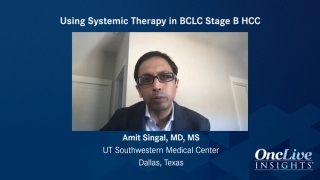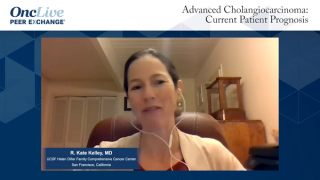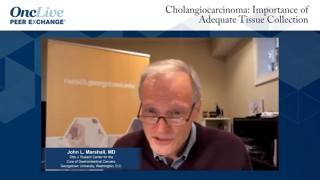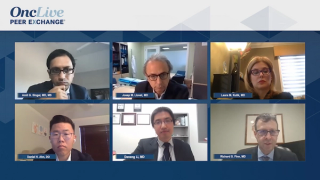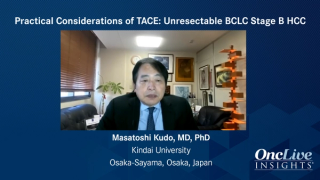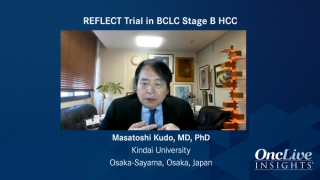
Gastrointestinal Cancer
Latest News

Latest Videos

CME Content
More News

Shubham Pant, MD, discusses key data that emerged in the gastrointestinal oncology space from the 2020 ASCO Virtual Scientific Program.

The FDA has issued a complete response letter to Merck and Eisai stating that it will not approve the applications that are seeking the accelerated approval of pembrolizumab in combination with lenvatinib for the frontline treatment of patients with unresectable hepatocellular carcinoma.

Tanios S. Bekaii-Saab, MD, FACP, discusses second-line treatment options in hepatocellular carcinoma.

Scott Kopetz, MD, PhD, FACP, discusses the rationale for the phase 3 BEACON CRC trial in BRAF V600E-mutant metastatic colorectal cancer.

The European Commission has approved single-agent olaparib as a maintenance treatment for adult patients with germline BRCA1/2-mutant metastatic pancreatic adenocarcinoma who have not progressed after a minimum of 16 weeks of a frontline platinum-based chemotherapy regimen.

Infigratinib conferred a clinically meaningful progression-free survival and overall response rate benefit when administered as a third- and later-line treatment for patients with FGFR2 fusion–positive cholangiocarcinoma.

Zev. A. Wainberg, MD, discusses findings from a phase 1/2 study of NALIRIFOX in patients with pancreatic ductal adenocarcinoma.

EDP1503, an investigational monoclonal microbial product, was safe and well-tolerated when administered in combination with pembrolizumab (Keytruda), and mechanistically drove some of the patient responses seen in a phase 1/2 study.

Harry H. Yoon, MD, discusses the updated results of the phase 3 KEYNOTE-061 trial in advanced gastric/gastroesophageal junction (GEJ) cancer.

Irinotecan monotherapy demonstrated similar clinical activity and improved safety compared with capecitabine plus irinotecan in patients with advanced gallbladder cancer, representing a potential second-line treatment for frail patients.

Anant Ramaswamy, MD, discusses a phase 2 multicenter clinical trial evaluating the efficacy of capecitabine plus irinotecan versus irinotecan monotherapy in advanced gallbladder cancer.

Daniel Catenacci, MD, discusses the challenges of developing novel therapies in gastroesophageal adenocarcinoma.

Ghassan K. Abou-Alfa, MD, discusses key eligibility criteria for the phase 3 PROOF trial in cholangiocarcinoma.

The safety and efficacy of maintenance olaparib in patients with BRCA1/2-mutated metastatic pancreatic cancer proved to be consistent irrespective of age, according to results of a subgroup analysis from the pivotal phase 3 POLO trial.

Yu Sunakawa, MD, PhD, further discusses the early real-world data from the DELIVER trial with nivolumab in patients with gastric/GEJ cancer and provided insight into what future analyses will examine.

Manish R. Patel, DO, further discusses next steps for entrectinib, as well as the need for genetic testing to identify uncommon gene rearrangements in GI malignancies.

Bruno Sangro, MD, PhD, discusses the efficacy and safety findings from a study of combination durvalumab and tremelimumab, as well as the clinical need for alternative combination regimens in advanced hepatcellular carcinoma.

The regimen of liposomal irinotecan plus 5-fluorouracil/leucovorin plus oxaliplatin demonstrated a tolerable safety profile with promising antitumor activity when used as frontline treatment in patients with locally advanced or metastatic pancreatic ductal adenocarcinoma.

The combination of atezolizumab and bevacizumab demonstrated comparable clinical activity and safety versus sorafenib in older and younger patients with previously untreated, unresectable hepatocellular carcinoma.

Manish R. Patel, DO, discusses the role of entrectinib in gastrointestinal malignancies.

Bruno Sangro, MD, PhD, discusses the efficacy and safety findings from the long-term analysis of the CheckMate-459 trial in advanced hepatocellular carcinoma.

Bruno Sangro, MD, PhD, discusses the updated findings from the phase 3 CheckMate-459 trial, which evaluated the use of nivolumab and sorafenib in the treatment of patients with advanced hepatocellular carcinoma.

The FDA has approved pembrolizumab (Keytruda) for the first-line treatment of patients with unresectable or metastatic microsatellite instability–high or mismatch repair deficient colorectal cancer.

Yelena Y. Janjigian, MD, discusses updated results from the phase 2 DESTINY-Gastric01 trial in previously treated patients with HER2-positive gastric cancer.
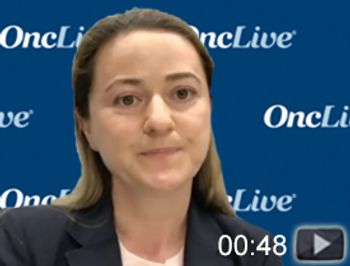
Angela Tatiana Alistar, MD, discusses the need to develop biomarkers in pancreatic cancer.






